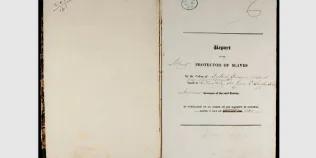An international team will analyse the testimony of hundreds of enslaved people who sought legal redress for the abuses and hardships they endured under British slavery.
The project will be ground-breaking as the digital resource it will create is being built from words spoken by enslaved people, rather than data about them, the researchers say.
Digitising project
The project has received a £1.5 million investment from the UKRI Arts and Humanities Research Council (AHRC).
Voices in Slavery’s Archive: Law, Place and Testimony in British Guiana will digitise, map and analyse the largest collection of first-person testimony of enslaved people from the Caribbean in existence - the Reports of the Protectors of Slaves.
These records are held in the UK’s National Archives and allow researchers to examine how enslaved people used the courts to make complaints relating to family life, work, health, violence, and a host of other issues.
Global barriers
The project also seeks to overcome global barriers of access to these important records by making them accessible to researchers anywhere in the world.
Led by Professor Diana Paton, the team will produce an online resource including the full text of the enslaved people’s complaints, and images of the original documents. It will allow users to explore geographic and thematic connections among the complaints.
The project will also create a physical facsimile of the documents, which will be deposited at the Walter Rodney National Archives of Guyana.
Working in partnership
Led by researchers from School of History, Classics and Archaeology, the project is a collaboration between the University of Guyana, Xavier University, the University of Sheffield Digital Humanities Institute, The National Archives (UK), the Walter Rodney National Archives of Guyana, and Guyana SPEAKS.
As well as complementing existing important digital resources on slavery, Voices in Slavery’s Archive will pioneer new methods to examine the history of slavery by combining archival research with digital tools, community engagement, and family and community history.
The project will run from March 2026 to February 2029 and will host its first workshops in Guyana and the UK in 2026.
Its advisory board includes members of the Guyana Reparations Commission and Guyana Heritage Society, along with senior scholars in Caribbean Digital Humanities and Guyanese History.
Image courtesy of National Archives


